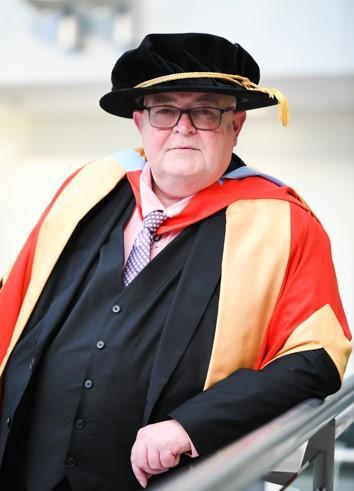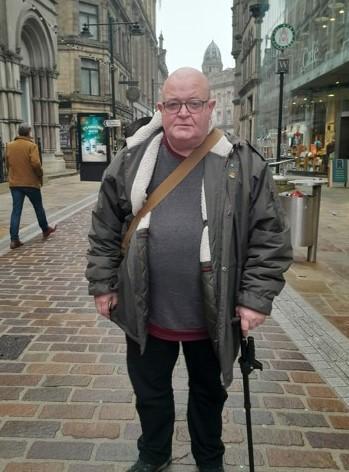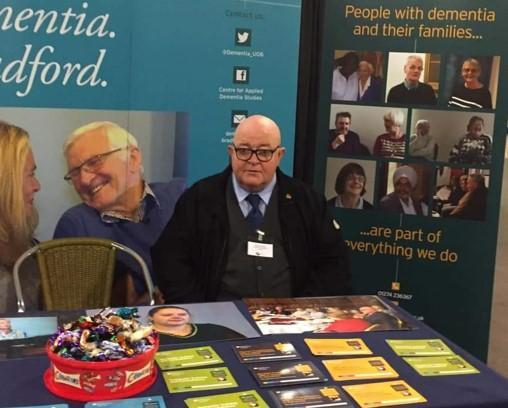'The University saved my life' - Dementia campaigner receives honorary doctorate

A FORMER soldier and truck driver who has a rare form of dementia has thanked the University of Bradford for “saving his life.”
Michael Andrews, 63, made the moving revelation ahead of receiving an Honorary Doctor of Health yesterday.
He said: “Never in a million years did I ever think I would have anything to do with a university, let alone receive an honorary doctorate.
“I had to read the letter six times. I thought they must have the wrong person or that it was a wind-up.
“The University saved my life. I feel incredibly proud to receive this honour.”
In 2017, aged 57, Michael was diagnosed with a type of dementia called Posterior Cortical Atrophy. He has since made it his mission to raise awareness of the condition, appearing in educational films, writing books and working with healthcare professionals and students to change the treatment and perception of people living with dementia.

Michael during his time as a truck driver
Michael first became concerned about his health nearly two years earlier, when he started to struggle at work as a long-distance lorry driver.
Motorway lanes blurred together at night, exit junctions were unclear and he found himself double checking place names that sounded similar, like Croydon and Crawley.
He said: “I put it down to tiredness and being overworked.”
At one point, he crushed his thumb under a forklift and when he tore muscles in his shoulder while using a crowbar to lift a pole on his trailer, he was forced to stop work. While off, he decided to address his concerns about his eyesight.
Michael, who is originally from Lisburn, Northern Ireland and served in the Army from age 16 to 30, said: “It took 16 months to get a diagnosis, during which time I underwent CT and MRI scans, blood tests, eye tests … you name it. The doctors discovered there was some shrinkage at the back of my brain, but they were still baffled.”
Difficult time
PCA dementia does not present the sort of symptoms we tend to associate with dementia, such as memory loss and confusion. Instead, Michael struggles to differentiate between groups of objects, for example on a supermarket shelf, and he suffers balance issues, for which he uses a walking stick.
He was told by several health professionals that he was the first person they had encountered with the rare form of the condition.
Michael, who has lived in Bradford for 33 years, said: “After the diagnosis, I went through a really difficult time. I didn’t want to talk to anyone or see anyone.
“I live alone and, at one point, there was a discussion as to whether I would need to go into a care home.
“Then I was referred to a day centre which was filled with people in their 80s and 90s, some of whom had very advanced dementia. I just kept thinking, ‘I don’t belong here.’”

Michael pictured recently in Bradford
At that low point, Michael was asked to be part of a research group for a 12-week Journeying Through Dementia project led by Gail Mountain, Professor of Applied Dementia Research, University of Bradford and managed by the University of Sheffield Clinical Trials Unit.
“It was my life saviour,” he said. “On the first day, I was asked if I’d like a hot drink and when I said yes, they told me, ‘There’s the kettle and the cups.’
“They wanted you to keep doing everything for yourself, to keep that habit in the hope you will be able to remember how to do it for as long as possible.
“You could talk about your issues, whether it was about your mental health or physical problems, and they would give you practical advice on how to cope. That’s what I needed.
“It was simple things, but they made a big difference. For example, when I see a dark puddle, my brain tells me it’s a black hole and even though I know it’s not, I will feel off balance. We talked about giving puddles a wide berth to avoid that happening.”

Michael regularly volunteers with the University's Centre for Applied Dementia Studies
As part of Journeying Through Dementia, Michael made a film and presented at an information event at Bradford City Hall.
Since then, he has been involved in numerous research projects as an Expert by Experience for the University of Bradford’s Centre for Applied Dementia Studies, as well as sharing his experience with physiotherapy, pharmacy and occupational therapy students.
He has co-authored a book to help those diagnosed with PCA dementia, co-produced a teaching module for the University, “Understanding the Me in Dementia,” and contributed to a new national set of guidelines for the Royal College of Speech and Language Therapists for working with people living with the condition.
Other organisations Michael has worked with include Sheffield Hallam University, Leeds Beckett, University College London, King's College London, Alzheimer’s Research UK, Rare Dementia Support and The Alzheimer’s Society.
A natural joker, he has lost none of his sense of humour.
In May 2022, he followed MP Sajid Javid onto stage at the Alzheimer’s Society annual conference and, tongue-in-cheek, thanked the then Secretary of State for Health for the “warm up.”
In October, on a trip to Llandudno, north Wales with Pathways, a Bradford support group for younger people affected by dementia, he suggested a game of I Spy at the top of the Ferris wheel. His fellow passengers were not impressed when he cheekily revealed the answer was “loose rivet.”
Resilience
He said: “I love the work I do with dementia. I’ve learned so much about myself.
“I’ve learned I can stand up in front of people and deliver a speech and have an impact.
“I particularly enjoy being involved with the University of Bradford because the work that goes on there is fascinating.
“Without that first research project, I’m sure I would be in a care home now.
“My hope is that people who are diagnosed will never have to experience what I went through.”
Jan Oyebode, Professor of Dementia Care, Centre of Applied Dementia Studies, University of Bradford, said: “Michael is an inspirational figure. His example of resilience in the face of the most difficult circumstances challenges us all to delve deep, find our inner strength and rise to the hurdles life places in our path.”
